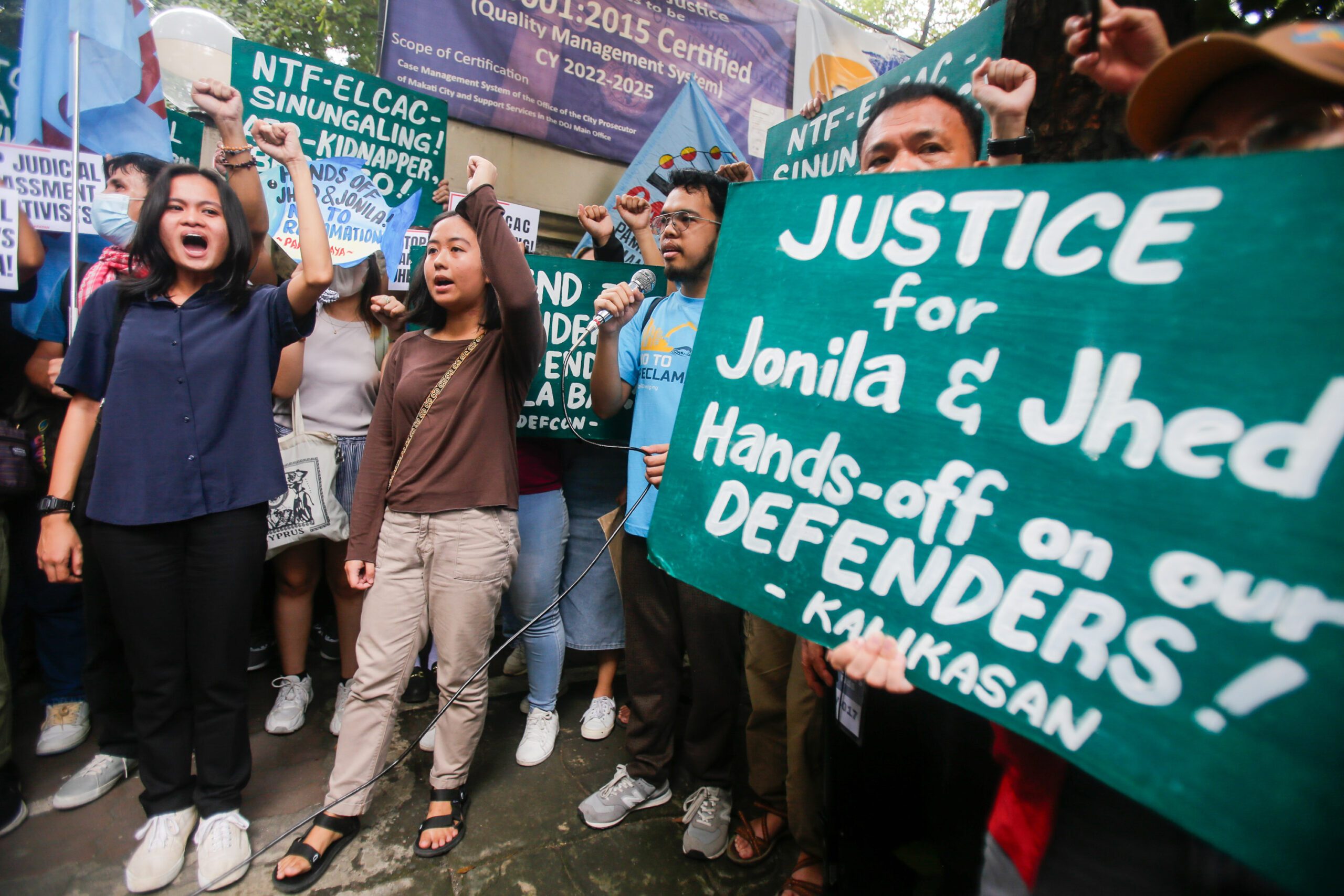SUMMARY
This is AI generated summarization, which may have errors. For context, always refer to the full article.

MANILA, Philippines – The Supreme Court (SC) granted the protective writs filed by young environmental activists allegedly abducted by the Armed Forces of the Philippines (AFP) last year.

In a statement on Thursday, February 15, the High Court said the SC magistrates moved to grant the writs of amparo and habeas data petitions filed by Jonila Castro and Jhed Tamano. The SC also granted them a temporary protection order.
A writ of amparo is a legal remedy, which is usually a protection order in the form of a restraining order. The writ of habeas data, meanwhile, compels the government to destroy information that could cause harm. (READ: Supreme Court to finish review on protective writs by early 2024)
The High Court issued the temporary protection order motu proprio (initiated by the court on its own) as an interim relief against the authorities, who are respondents in the case. All the respondents, including those who act and operate under their orders, are prohibited “from entering within a radius of one kilometer from the persons, places of residence, school, work, or present locations, of petitioners, as well as those of their immediate families.”
The named respondents in the decision penned by Associate Justice Ramon Paul Hernando are:
- Lieutenant Colonel Ronnel B. Dela Cruz and members of the 70th Infantry Battalion of the Philippine Army;
- Captain Carlito Buco and members of the Philippine National Police Bataan;
- National Security Council Assistant Director General Jonathan Malaya, the National Task Force to End Local Communist Armed Conflict (NTF-ELCAC), and all others acting under their direction, instructions, and orders.
The two activists, who were doing ground work on reclamation in Bataan, were first reported missing by progressive groups, and prompted the probe of the Commission on Human Rights. Later, security officials announced that Castro and Tamano were already “safe and sound” because they allegedly “voluntarily surrendered” to the military.
This was not new because the government, particularly during Rodrigo Duterte’s term, liked to present “surrenderees” to encourage testimonies against progressive groups.
Castro and Tamano went off-script during an NTF-ELCAC-organized presser to belie claims they had surrendered.
Because of their revelations, which blindsided NTF-ELCAC, the two activists were slapped with a perjury complaint filed by Dela Cruz. Later, DOJ prosecutors dismissed the perjury, but moved to indict Castro and Tamano with slander or grave oral defamation.
The granted writs have no direct effect on the slander case. The said charge will proceed to trial, since the DOJ prosecutors found sufficient evidence to pursue the case.
Court’s explanation
The SC said Castro and Tamano proved by substantial evidence their allegations, which merited the protection of their freedoms through the legal remedies. The High Court explained that it found that the elements of enforced disappearance were present, since the petitioners were forcibly taken on September 2, 2023.
This allegation was proven through:
- An affidavit by a member of rights group Karapatan Gitnang Luzon;
- The two activists’ proof that they left their footwear during struggle with captors;
- Photos of Castro and Tamano’s footwear left at the scene of abduction.
The court added that Rosielie, Castro’s mother, tried her best to locate her missing daughter. She also coordinated with a certain Justin Gutierrez, who was said to have introduced himself as a member of a military to Rosielie, and with the Orion municipal police. However, Castro’s mom did not receive any positive response from them, the SC said.
As to the habeas data petition, the SC said that Malaya’s statement during his ABS-CBN interview was “already an open and express threat to petitioners’ right to life, liberty, and security publicly verbalized by government official admittedly engaged in the gathering, collecting, and storing of data and information against petitioners.”
Malaya said during the interview that the authorities were going to “expose all information they have on [Castro] and [Tamano] and that “they may be charged [of perjury] in relation to their alleged execution of an affidavit while in custody of the 70th Infantry Battalion.”
“There was an established violation or threat to the life, liberty, or security of petitioners by respondents. The writs are called to be issued for reasons so obvious on the mere face of the Petition,” the SC added.
The SC also directed the respondents to comply with section 9 of the rule on the writ of amparo, and section 10 of the rule on writ of habeas data. The said sections mandate the petitioners to explain their side, including their lawful defenses.
In multiple occasions, courts have granted the protective writs of activists. In the case of missing activists Ma. Elena “Cha” Pampoza and Elgene “Leleng” Mungcal, the SC compelled police and military officers, and other government officials to explain the two’s disappearances. – Rappler.com
1 comment
How does this make you feel?







Thanks to the Supreme Court for granting temporary protection to these activists against the type of military and police officials who were “influenced” by former President Digong Duterte.